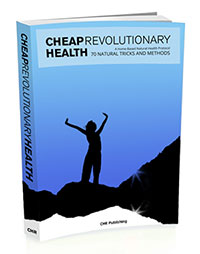Dr. Joel Fuhrman Interview
Dr. Joel Fuhrman has probably the most interesting & realisable approach to health and nutrition from the health gurus out there. He pioneered the idea that we need to eat food that has highest nutrient density per calorie. He developed the ANDI food scoring system (Aggregate Nutrient Density Index), which is being used, for example, at the Wholefoods health food store.
Dr Joel Fuhrman is a New York Times bestselling author, health researcher and a practising physician. He helps people heal from cancer, heart disease, diabetes, dementia, asthma, obesity and autoimmune diseases using natural means & diet. He is also the founder and Director of the Nutritional Research Foundation, a non-profit research organisation.
We at CHR were very fortunate to interview Dr. Joel Fuhrman. Our editor, Ulla, devised the questions for this interview. She has experimented with many different diets during the last 8 years (since 2009), logging the results in "my natural health journey", and found Dr. Fuhrman's diet to be probably the best one, especially since his approach seems to strike the right balance between the raw food diet and the cooked wholefoods approach. Dr. Joel Fuhrman has labelled this the 'nutritarian' way of eating, since the emphasis is on high nutrient content per calorie of food eaten.
Dr Joel Fuhrman Interview

Copyright: Dr. Joel Fuhrman.
Dr. Joel Fuhrman: There are three macronutrients that supply calories: carbohydrate, fat, and protein, and we need all three. The key is to choose high-quality, nutrient-dense sources of carbohydrate, fat, and protein. For carbohydrates (starches and sugars), beans, peas and other legumes are superior. Legumes are high in fiber and resistant starch, higher than whole grains. These factors reduce the glycemic load and calorie absorption from beans, and promote the growth of a healthy microbiome. Some people get more unfavorable reactions to higher glycemic food choices and do better with more beans, greens, nuts and seeds to lower the glycemic load of their diet.
Also, if a person requires more carbs to maintain energy, then they are not eating a healthy diet. They don’t need more carbs, they need to learn more about superior nutrition. When you eat pro-inflammatory foods, you build up free radicals, advanced glycation end products and they make you feel fatigued as digestion ceases and detoxification is enhanced while not digesting. This fatigue is the result of a poor diet and it induces excessive eating behavior. They should fully understand the concept of toxic hunger as I explained in my book, The End of Dieting. When your nutrient needs are not adequately met and you have too many toxins and free radicals, you feel frequent fatigue and the need to eat more frequently to keep your energy up. If you need to drink juice and eat brown rice to get your energy up, then your diet is poorly designed and sub-optimal and possibly deficient in something.
Although raw vegetables are powerful anti-cancer foods I don’t recommend a completely raw diet. I recommend a large raw salad or raw vegetables at the start of each lunch and dinner, plus fresh fruit and raw nuts and seeds; but also cooked vegetables. There are some nutrients that are destroyed or reduced by cooking (such as vitamin C), but there are others that become more accessible when vegetables are cooked (such as carotenoids). Raw diets tend to be a nutritional disadvantage because they rely too heavily on nuts and fruit and do not include enough greens, beans and other vegetables that are best eaten cooked.
Dr. Joel Fuhrman: This is a very rare problem and it is not true that many people report this. It is likely due to a food intolerance, not mold; and a person should not eat a food they get reactions like that to, or at least not eat very much of that.

Dr. Joel Fuhrman's Nutritarian Foodplate. Copyright: Dr. Fuhrman.
Dr. Joel Fuhrman: Whole and minimally processed soybeans (edamame, tempeh, and tofu) have anti-inflammatory properties. Meats tend to be high in arachidonic acid, which is pro-inflammatory. Animal products do not contain antioxidants and phytochemicals. Almond, soy, and hemp milks, provided they do not have added sugar or other additives, do not have pro-inflammatory properties, and can be used in small or moderate amounts. Intact whole grains are healthful foods and do not have pro-inflammatory properties, however, foods made with finely ground whole grain flour may still be high-glycemic, which is unfavorable for health, especially in the overweight.
CHR: What do you mean by 'intact whole grains'? I presume you don't recommend eating wholemeal bread? In your book 'Eat for Health' you mentioned that grains are not nutrient-dense.Dr. Joel Fuhrman: That does not mean I am against people eating some whole, intact grain. 'Intact' means not finely ground into flours. So quinoa, millet, wheat berries, and steel cut oats are considered intact grains, and are acceptable options.
CHR: For many conditions, e.g. cancer and candida, a low-sugar diet is usually recommended. How can such people ensure that they get enough carbohydrates in their diet and should fruit and fruit juice be avoided in these cases?Dr. Joel Fuhrman: Fruit juice is not a favorable food. I am not sure what a 'low-sugar' diet means. Sugar, honey, maple syrup, agave nectar, and other sweeteners are high glycemic and not healthy for anyone. Honey has the same chemical breakdown as sugar and is high glycemic, therefore it raises insulin too high, which is unfavorable. Fruit is different and has differing biological effects when eating due to fiber and flavonoids and phenol content. Candida is a trendy diagnosis with no specific meaning, usually phony or incorrect. If a person has yeast overgrowth in their gut it is almost always from poor health and a poor diet. Cancer patients should not avoid all fruit either. A nutritarian diet is ideal for prevention of cancer and even for reversing early stage cancers as it contains the most powerful anti-cancer foods prepared in a manner to retain phytochemical activity and maximize absorption, and it restricts animal protein which promotes IGF-1 and cell replication.
CHR: Many people don't seem willing to address their health unless they can see test results that something is wrong. Can you recommend reliable (and ideally affordable) ways to test for mineral deficiency, inflammation and other most common & important imbalances? E.g. Is there a reliable hair mineral analysis lab (I had a bad experience with one), are the blood mineral tests reliable, and are there other, simpler tests?
Dr. Joel Fuhrman: No, this testing is expensive and people eating healthfully do not need this.
CHR: There are some extremely healthy people who eat high-protein diets, e.g. Hit Richards who is featured in my article on 'Calisthenics'. He can do various types of push-ups standing on his hands. I find it very difficult to believe therefore that high protein diets are unhealthy (though I understand meat & dairy can cause long-term problems). Even Ayurvedic doctors sometimes prescribe red meat temporarily as a remedy. Eating high-protein on a raw food diet seems very challenging, however. How would you recommend this problem is solved?Dr. Joel Fuhrman: Physical fitness and strength does not mean good health and a long life. Even though the person might seem healthy on the outside, there is no such thing as an extremely healthy person eating a high protein diet, because excessive consumption of animal protein is cancer-promoting and leads to DNA alterations that eventually lead to cancer and a premature death. A poor diet will still result in plaque deposits in the arteries, and an increased risk of cancer, even if the person looks slim and muscular. Low-carbohydrate, high-animal protein diets have been associated in many scientific studies with an increase in the risk of cancer, heart disease and premature death. There is no reason to ever prescribe a diet that promotes cancer.
Dr. Joel Fuhrman: The "Eat To Live, Quick and Easy Cookbook" is available in May 2017. It is currently available for pre-order on Amazon.
CHR: If a person suffers from IBS, and its typically related histamine intolerance, leaky gut and inability to digest starches, what would you recommend they eat? Keeping in mind that they often can't tolerate too much insoluble fiber either, and therefore many vegetables and some fruit and nuts have to be eliminated from the diet temporarily.
Dr. Joel Fuhrman: Some people need individual adjustment to their diet based on unique food intolerances and digestive problems. I do have a low histamine nutritarian diet that works well for those with urticaria and histamine intolerance.
Dr. Joel Fuhrman: Readers can become members of our website where these type of questions are answered.
CHR: What are the benefits people most often experience from following your diet recommendation?Dr. Joel Fuhrman: Weight loss, increased mental clarity, normalization of cholesterol and blood pressure and reversal of diabetes and heart disease.
- Dr. Joel Fuhrman
Other Books Published by Dr. Joel Fuhrman:
Dr. Fuhrman: "Eat to Live: The Amazing Nutrient-Rich Program for Fast and Sustained Weight Loss, Revised Edition":
Dr. Fuhrman: "The End of Heart Disease: The Eat to Live Plan to Prevent and Reverse Heart Disease":
Dr. Joel Fuhrman: "The End of Diabetes: The Eat to Live Plan to Prevent and Reverse Diabetes":
Dr. Fuhrman: "The Nutritarian Handbook and ANDI Food Scoring Guide":
Dr. Joel Fuhrman: "Super Immunity: The Essential Nutrition Guide for Boosting Your Body's Defenses to Live Longer, Stronger, and Disease Free":
And his other books can be browsed here: Amazon.
Continue reading....
The Benefits of Quitting Dairy
My Favourite Green Smoothie Recipe
How Inflammation Influences Behaviour
Home Test for Food Intolerance
Autism Helped by Digestive Enzymes
Connection Between Alkalinity, Antioxidants and Negative Ions
My Water Fasting Diary
Amazing Benefits of Live Spring Water
We Recommend
Latest Articles
Most Popular Articles
Collection of Best Raw Food Articles
Juice Fasting Articles
Book Summaries
Natural Remedy Library A-Z

Edition 3.0: Cheap Revolutionary Health Ebook: 68 Natural Tricks and Methods - The Amazing Power of Small Everyday Tasks
To be safe, please consult your health-care provider before attempting self-treatment for health issues.
Navigation
Home Latest Articles Conditions A-Z Raw Food Juice Fasting Recipes My Health Journey Best ArticlesGet in Touch:
Contact Us Instagram: "Good Life Meals"About CHR:

Ulla is the Editor of Cheap Health Revolution, covering natural remedies and health solutions. Read more about Ulla and this website here: "About CHR"
















